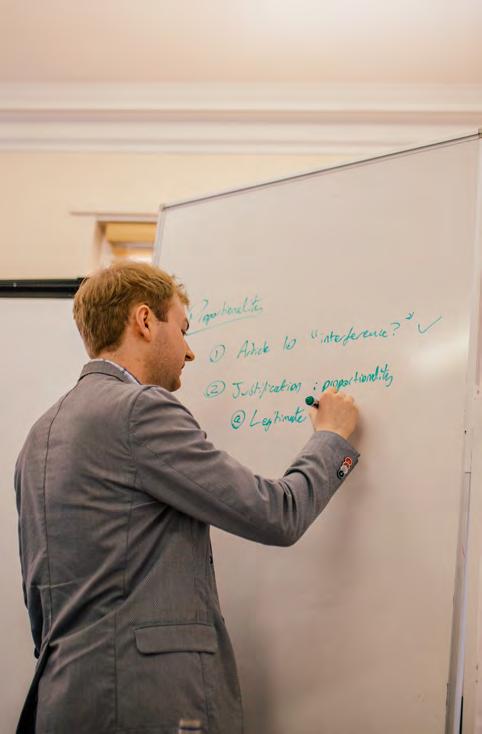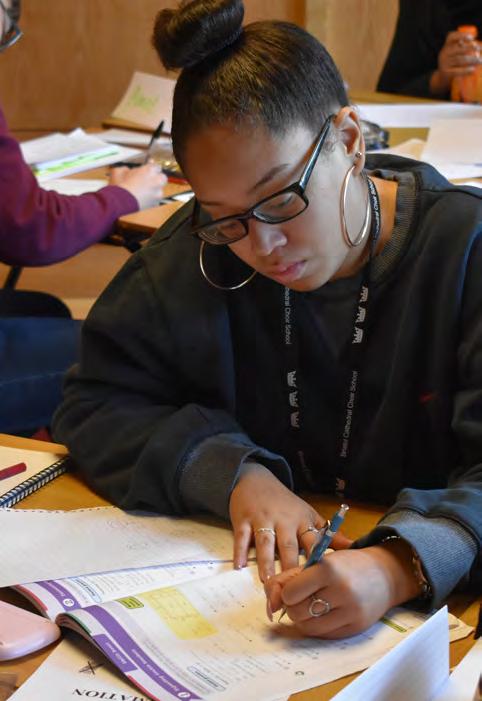
2 minute read
ACHIEVING OUR SHORT-TERM GOALS
Increase in short-term aspirations to higher education and greater self-efficacy
Despite the shift to a shorter, online summer course, aspirations to Higher Education increased in the short term.
Advertisement
We saw a 16 percentage point increase in the number of participants who were ‘fairly likely’ or ‘very likely’ to apply to a highly-selective university between the start and end of the summer programme. This is compared to an average 22 percentage point increase across our previous four cohorts who experienced the summer course in person. The increase in those likely to apply corresponded with a decrease in those ‘not very likely’ or ‘not at all likely’ to apply, reducing by 10 percentage point from 23% before summer to 13% after summer.
In addition, we measured students’ self-esteem, autonomy and control before and after the summer course using a T test to analyse whether activities
Cohort 5
such as peer mentoring, group work and initial coaching sessions had an effect on students’ selfefficacy. This year, we saw a statistically significant increase in both measures of self-esteem and autonomy and control with small effect size. 33% reported that they had high self-esteem before the summer, rising to 43% after the course. The proportion of students who reported that they did not have high self-esteem reduced from 36% to 19% after the summer course.

These short-term results suggest that our online programme was still effective at increasing aspirations to highly-selective universities despite the lack of lived-in university experience for our students, and that it provided the tools and environment for self-growth even in an online setting. We explore the possibility of continuing online delivery beyond the pandemic in the ‘What we learnt’ section.
How impact on aspirations compares between inperson and online courses
Not at all likely
Not very likely
Depends
Fairly likely
Very likely
Perceptions of University
One of the most powerful impacts our course has is changing participants’ perceptions of what university is and what kind of person goes to university. We measure this by asking participants for a single word they most associate with ‘university’ at the beginning and end of our summer course.
Prior to the course, the most common word participants associated with university was ‘stressful’. University was ‘expensive’ and a place of ‘work’ and ‘exams’. Participants thought university would be ‘hard’, ‘difficult’, ‘intense’, and ‘demanding’.
After the course, these negative associations were replaced with more positive ones. The number of students who thought university was ‘stressful’ almost halved, and in contrast, the number who thought it was ‘exciting’ more than tripled, becoming the most common word for participants to associate with university. Many participants had come to see university as an ‘adventure’ and that it would be ‘fun’; for some it was even a place of ‘dreams’.
At the end of the Universify course, participants associated university with ‘self-growth’ seeing it as an ‘opportunity’, a chance to be ‘independent’ and ‘explorative’. Students recognised that it was important to be ‘hardworking’ and ‘dedicated’ but no longer thought university would be ‘tedious’. Through the programme, some students came to see university as ‘achievable’ and ‘worthwhile’, whereas before the summer some students had seen university as ‘unlikely’.
There was also a change in participants’ understanding about what was most important to be a university student, with a focus on being ‘curious’ and ‘passionate’ as opposed to simply being ‘intelligent’, a word which was more common pre-course.
Participants’ views can also be seen to have shifted as a whole, not just in respect to specific words. Overall, we saw a 25% increase in positive words and a 48% decrease in negative words between the start and end of the summer course. This shows the cohort’s overall perceptions have changed significantly, as well as in respect to specific words.









